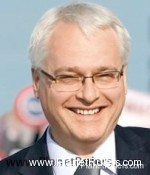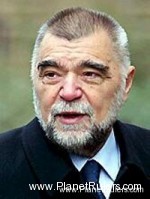Zoran Milanovic, President of Croatia (elected on Jan 5, 2020 with 52.7% of the votes)
 Zoran Milanović (born 30 October 1966) is a Croatian politician who has served as President of Croatia since 19 February 2020. Prior to assuming the presidency, he was Prime Minister from 2011 to 2016, and president of the Social Democratic Party from 2007 to 2016.
Zoran Milanović (born 30 October 1966) is a Croatian politician who has served as President of Croatia since 19 February 2020. Prior to assuming the presidency, he was Prime Minister from 2011 to 2016, and president of the Social Democratic Party from 2007 to 2016.
After graduating from the Zagreb Faculty of Law, Milanović started working in the Ministry of Foreign Affairs. He served as an advisor at the Croatian Mission to the European Union and NATO in Brussels from 1996 to 1999. During the same year he joined the Social Democratic Party. In 1998 he earned his master’s degree in European Union law at the Flemish University in Brussels and was an assistant to the Foreign minister of Croatia for political multilateral affairs in 2003. In June 2007 he was elected president of the SDP, following the death of the long-time party leader and former prime minister Ivica Račan. Under Milanović’s leadership the party finished in second place in the 2007 parliamentary election and was unable to form a governing majority. Despite losing the election, he was reelected party leader in 2008. In 2011 Milanović initiated the formation of the Kukuriku Coalition, uniting four centre to centre-left political parties. The coalition won an absolute majority in the 2011 parliamentary election, with the SDP itself becoming the largest party in Parliament. Milanović thus became Prime Minister on 23 December 2011, after the Parliament approved his cabinet.
The beginning of his prime ministership was marked by efforts to finalise the ratification process of Croatia’s entry into the European Union and by the holding of a membership referendum. His cabinet introduced changes to the tax code, passed a fiscalisation law and started several large infrastructure projects. After the increase in the value of the Swiss franc, the government announced that all Swiss franc loans would be converted into euros. Milanović supported the expansion of same-sex couples’ rights and introduced the Life Partnership Act. After the inconclusive 2015 election and more than two months of negotiations on forming a government, he was ultimately succeeded as prime minister by the nonpartisan technocrat Tihomir Orešković in January 2016. After Orešković’s government fell, Milanović led the four-party People’s Coalition in the subsequent snap parliamentary election in September 2016. In the election, his coalition suffered a surprise defeat to the centre-right Croatian Democratic Union and Milanović announced his withdrawal from politics. He then entered the consulting business and worked as an advisor to Albanian prime minister Edi Rama.
On 17 June 2019, Milanović announced that he would be running for the office of president in the 2019–20 election as the candidate of the Social Democratic Party; he was officially nominated on 6 July 2019. He thereafter proceeded to receive the most votes (29.55%) in the first round of the election on 22 December 2019, ahead of incumbent president Kolinda Grabar-Kitarović (26.65%) and to be elected as the fifth President of Croatia in the runoff on 5 January 2020, with 52.66% of the vote. He became the first presidential candidate in Croatian history to receive more votes than an incumbent officeholder in the first round of an election, the second person in Croatia to defeat an incumbent running for reelection and the first (post-independence) prime minister of Croatia to be elected head of state.
Source: https://en.wikipedia.org/wiki/Zoran_Milanovi%C4%87
Kolinda Grabar-Kitarović, Former President of Croatia (since Feb 19, 2015)
 Kolinda Grabar-Kitarović (pronounced [kȏlǐndǎ gr̩abâr̩ kitǎːr̩oʋit͡ɕ]; born 29 April 1968) is a Croatian politician serving as President of Croatia since February 2015.
Kolinda Grabar-Kitarović (pronounced [kȏlǐndǎ gr̩abâr̩ kitǎːr̩oʋit͡ɕ]; born 29 April 1968) is a Croatian politician serving as President of Croatia since February 2015.
From 2011 to 2014 she served as Assistant Secretary General for Public Diplomacy at NATO under secretaries Anders Fogh Rasmussen and Jens Stoltenberg. She is the first woman ever to be appointed to the position. Previously, she was the Minister of Foreign Affairs of Croatia from 2005 to 2008 in the Cabinet of Ivo Sanader I, and Croatia’s ambassador to the United States from 2008 to 2011.
Grabar-Kitarović has been a member of the conservative Croatian Democratic Union party from 1993 until 2015 and one of three Croatian members of the Trilateral Commission. She had to resign both positions due to taking office of President of Croatia.
Grabar-Kitarović has been married to her husband Jakov Kitarović since 1996 and they have two children: Katarina (born c. 2001) and Luka (born c. 2003). She speaks Croatian, English, Spanish and Portuguese fluently and has basic understanding of German, French, and Italian.
Source: https://en.wikipedia.org/wiki/Kolinda_Grabar-Kitarovi%C4%87
Ivo Josipovic, Former President of Croatia
Took office on 18 February 2010.
He is a university professor, a member of parliament and a composer. He tought criminal procedure law, international criminal law and misdemeanour law at the University of Zagreb Faculty of Law. He was a member of several domestic and international legal and artists’ associations. He has published 85 scholarly and professional works in domestic and international journals and written some 50 compositions performed by prestigious Croatian and foreign musicians.
Ivo Josipovic was born in Zagreb on August 28, 1957, where he attended primary and secondary school. He graduated from the Faculty of Law in 1980 and passed my bar examination. He completed my MA on the topic of criminal law in 1985, and my PhD in 1994 with a dissertation titled “Right of Arrest and Detention in Criminal Procedure Law”. He represented Croatia before the International Court of Justice and the International Criminal Tribunal for the former Yugoslavia. He participated in several international projects and acted as a Council of Europe expert in the evaluation of prisons in Ukraine, Mongolia and Azerbaijan.
After attending secondary music school, he continued my music education in the Composition department of the Zagreb Academy of Music. He wrote compositions for different instruments, chamber orchestras and the symphony orchestra; and among other works, he composed “Igra staklenih perli” (Glass Bead Play), “Tuba Ludens”, “Samba da Camera” and “Hiljadu lotosa” (A Thousand Lotuses). He received a number of domestic and international prizes for my compositions, including the European Broadcasting Award and the Croatian discography award “Porin,” in 1999 and 2000. These are today performed by numerous domestic and foreign soloists and orchestras. He speaks English and intermediate German.
From 1980 he was a member of the Communists’ Union of Croatia and participated in its democratic transformation; he was one of the initial drafters of the first statute of the Social Democratic Party (SDP). In 1994, he interrupted my engagement in politics and the SDP and fully devoted myself to law and music. However, my political passions could not be stifled, and so he returned to politics in 2003. Upon the invitation of Ivica Ra?an, he became an independent MP of the SDP in the Croatian Parliament and Vice-President of the SDP Representatives’ Club. During his 2005 mandate, he was a representative in the City of Zagreb Assembly. In 2007, he was re-elected to the Croatian Parliament. In the Parliament, he has been a member of parliamentary committees for legislation, the judiciary and the Constitution, for parliamentary rules of procedure and for the political system. He was also a member of the committee for deliberating on conflict of interest. Last year he formally renewed his membership in the SDP. Today, he is the SDP candidate for President. The basic concept that his candidacy rests upon is “NEW JUSTICE” – a social and legal framework for the creation of a better Croatian society, which would address deep social injustices and the trauma caused by a mismanaged transition , and redefine our social values. By fighting corruption and organised crime, he aims to make Croatia a safe country for its citizens and their families.
He is married to Tatjana, also a university professor of law, and he has an 18 year-old daughter, Lana.
Stjepan Mesic, Former President of Croatia
Stjepan Mesic was born on 24 December 1934 in Orahovica. Father Josip Mesic and mother Magdalena Mandica Mesic married in 1931 and had two children. Mother died in 1936 and his sister Marija was sent to uncle Tomo Pernar in France while care of Stipe was taken over by grandmother Marija until his father married again and stepmother took over.
Little Stjepan spent World War 2 hiding on Papuk mountain and occasionally liberated Orahovica until when during last offensive he flees to Hungary with his family and some 10,000 other refuges. Family moved to Nasice were his father become president of Municipal board. Family soon moves to Osijek were Stipe finishes forth grade of primary school and two out of eight year gymnasium. Together with his father new position family moves back to old family house in Orahovica Stjepan Mesic completes gymnasium in Pozega. At the end of school he become member of Communist Party of Yugoslavia.
In autumn 1955 attends Faculty of Law at the University of Zagreb and in 1961 graduates. Same year he married Milka Dudunic from Hrvatske Kostajnice and has two daugthers, Sasha born in 1961 and Dunja born in 1963.
Serves military service in 1961, six months in School for reserve officers in Bileca and six in Nish.



